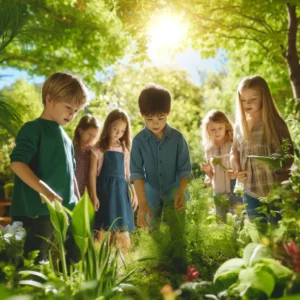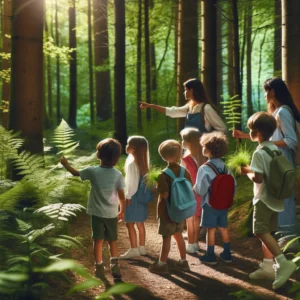
In the rapidly evolving field of early childhood education, innovative approaches are continually emerging to foster the holistic development of young minds. Among these, nature-based education stands out for its profound impact on children’s physical, cognitive, social, and emotional growth. This educational approach integrates outdoor activities and natural environments into the learning process, offering unique benefits that traditional classroom settings may not provide. In this article, we delve into the multifaceted advantages of nature-based education for early childhood development and explore how it can be seamlessly integrated into preschool programs.
Physical Development
One of the primary benefits of nature-based education is the enhancement of physical development. Outdoor play areas provide ample space for activities that promote gross motor skills, such as running, jumping, climbing, and balancing. These activities not only strengthen muscles and improve coordination but also encourage children to engage in more dynamic and complex movements than those typically allowed indoors.
- Gross Motor Skills Enhancement: In natural settings, children have the opportunity to interact with varied terrains, which helps in developing balance and agility. Activities like hiking, climbing trees, and playing on uneven surfaces challenge their physical abilities and contribute to overall fitness.
- Fine Motor Skills Development: Nature-based education also supports the development of fine motor skills. Activities such as collecting leaves, picking flowers, or using sticks to draw in the dirt require precise hand movements and coordination.
Cognitive Growth
Nature-based education significantly stimulates cognitive development. The sensory-rich environments of the outdoors—filled with diverse textures, colours, sounds, and smells—enhance children’s sensory perception and cognitive abilities.
- Enhanced Curiosity and Exploration: Natural settings ignite children’s curiosity and encourage them to explore. This exploration leads to hands-on learning experiences, fostering critical thinking and problem-solving skills. For instance, observing the life cycle of plants or investigating the habits of insects provides practical lessons in biology and ecology.
- Improved Concentration and Focus: Studies have shown that time spent in nature can improve concentration and attention spans. The calming effect of natural environments helps children stay focused on tasks for longer periods, making outdoor activities an excellent complement to indoor learning.
Cognitive Challenges: Nature provides endless opportunities for cognitive challenges. Simple activities like identifying different types of leaves or counting stones can be turned into educational games that reinforce learning concepts in an engaging manner.

Social and Emotional Development
The social and emotional benefits of nature-based education are profound. Outdoor settings provide a unique platform for children to interact with their peers, learn cooperation, and develop emotional resilience.
- Social Skills Development: The collaborative nature of many outdoor activities, such as team games or building projects, requires children to communicate, share, and work together. These interactions help develop essential social skills and foster a sense of community.
- Emotional Regulation: Being in nature has a soothing effect, which can help children manage their emotions better. Activities like gardening or nature walks provide a tranquil environment where children can express their feelings and learn self-regulation techniques.
- Empathy and Compassion: Nature-based education often involves caring for plants and animals, which teaches children empathy and compassion. Understanding the needs of living things and taking responsibility for their well-being fosters a caring attitude and respect for the environment.
Connection with Nature
Developing a connection with nature at an early age can have lasting benefits. Children who are regularly exposed to natural environments are more likely to develop a lifelong appreciation for the outdoors and sustainable practices.
- Environmental Awareness: Regular interaction with nature instils a sense of environmental stewardship in children. They learn about the importance of conservation and the impact of human activities on the environment, fostering a generation that is more conscious of ecological issues.
- Sustainable Habits: Activities like recycling, composting, and planting trees are integral to nature-based education and teach children sustainable habits. These practices can be carried into adulthood, contributing to a more sustainable future.
Integrating Nature-Based Education
Integrating nature-based education into preschool programs requires thoughtful planning and a commitment to providing diverse outdoor experiences. Here are some strategies to effectively incorporate this approach:

- Outdoor Classrooms: Create dedicated outdoor learning spaces where children can engage in educational activities. These areas can include gardens, sandpits, and natural play structures.
- Nature Walks: Regular nature walks can be organised to local parks, nature reserves, or even the school grounds. These walks can be themed around specific topics, such as plant identification or bird watching.
- Gardening Projects: Implementing gardening projects in the curriculum allows children to learn about plant life cycles, nutrition, and the importance of caring for living things. Gardening can also be a therapeutic activity that promotes emotional well-being.
- Sensory Play: Sensory play activities using natural materials like sand, water, leaves, and stones can stimulate children’s senses and enhance their cognitive development.
Parental Involvement
Parental involvement is crucial in maximising the benefits of nature-based education. Encouraging parents to engage in outdoor activities with their children can strengthen the learning experience and foster a deeper connection with nature.
- Family Outings: Encourage families to spend time outdoors together. Activities such as hiking, picnicking, or visiting nature parks can create lasting memories and reinforce the concepts learned at school.
- Home Gardening: Promote the idea of home gardening projects that families can undertake together. This not only provides a practical learning experience but also helps children see the continuity of their education beyond the classroom.
- Nature-Based Homework: Assign nature-based homework tasks, such as creating a nature journal or conducting simple experiments, to encourage children to explore and learn outside of school hours.
Nature-based education offers a holistic approach to early childhood education that supports the physical, cognitive, social, and emotional development of young children. By integrating outdoor activities and natural environments into the learning process, educators can create enriching experiences that foster a lifelong love for learning and nature. As we continue to explore and implement innovative educational practices, nature-based education stands out as a powerful tool to nurture well-rounded, environmentally conscious individuals.
By embracing the benefits of nature-based education, we can provide our children with the best possible start in life, preparing them not only for academic success but also for a healthy, balanced, and fulfilling future. At Applebee Kids, we are committed to incorporating these principles into our preschool programs, ensuring that our students grow and thrive in harmony with the natural world.
